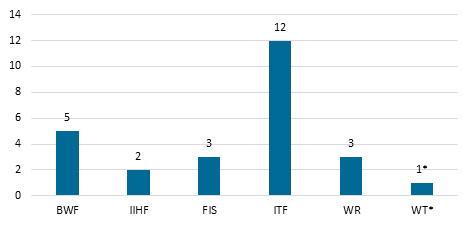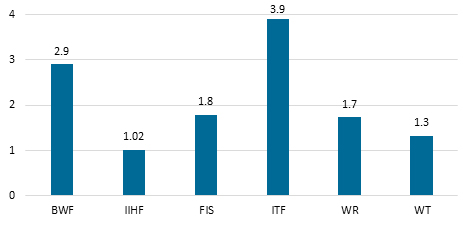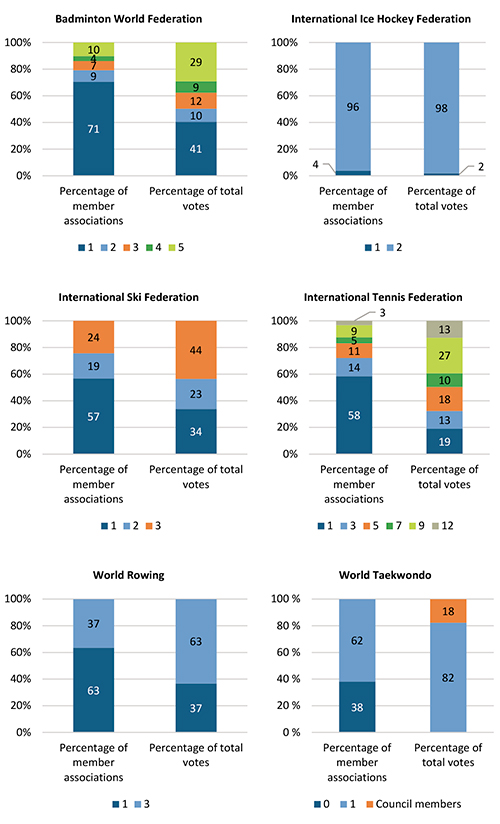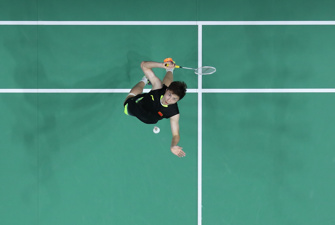New research: Alternative voting systems may lead to better governance in sport
The voting system ’one nation, one vote’ is used in most international sports federations, but it leads to challenges to good governance. In this article, we present new research to stimulate debate about alternatives to ‘one nation, one vote’.
Hassan Moustafa has been president of the International Handball Federation (IHF) since 2000 with re-elections in 2004, 2009, 2013, 2017, and 2021.
The road to re-election for Hassan Moustafa has been paved by admitting new national members to the IHF. During the period from 2000 to 2021, the IHF has accepted more than 60 new member associations. Many of these new member associations have little knowledge or interest in handball and do not have national tournaments either, but nevertheless, they have exactly the same voting power in the IHF as big handball nations such as Denmark, Norway, and Germany when it comes to presidential elections.
The case of the IHF and Hassan Moustafa illustrates a challenge to the democratic processes in international sports federations. Most international sports federations use the principle of ‘one nation, one vote’, but according to dr. Jürgen Mittag from the German Sports University, the different sizes and ambitions of member associations in an international sports federation can foster “the dark side of sport such as corruption and vote buying”. Or as in the case of handball, new member association giving their vote at the presidential election in return for developmental funds.
The Danish daily Politiken revealed in 2015 that out of the then 204 member associations of the IHF, less than half had a national team or a national tournament. Some of the federations acknowledged they did not even have handball players.
The IHF is just one example among many of power concentration and poor governance in international sport which has come to light during the last two decades. Play the Game’s research on governance in international sport shows that most federations do not meet basic requirements for good governance and that the system of ‘one nation, one vote’ poses challenges to democratic processes in the federations.
“At a first glance, ‘one nation, one vote’ sounds democratic, because small nations get the same voting power as bigger ones, like in the United Nations General Assembly. But this system puts the nation before the individual athlete,” says Play the Game’s international director Jens Sejer Andersen.
“If we regard each athlete as the cornerstone of democracy in sport, the picture becomes very different. How fair is it that over 750,000 handball players in Germany have to share only one vote at the IHF General Assembly where one vote is also given to tiny island states who can barely muster a national team? More influence must be given to those who are affected by decisions,” Jens Sejer Andersen says.
Play the Game has now carried out research on alternative voting systems that could be adopted by sports federations.
“Alternative systems to ‘one nation, one vote’ might lead to better governance in sport. But we need more information about how they are composed, what their advantages are, and how they affect voting power. This piece of research is a first step,” explains Jens Sejer Andersen.
Few international sports federations use an alternative
The study shows that only seven of 35 international Olympic sports federations currently use a weighted voting system. They are the Badminton World Federation (BWF), World Rowing (WR), World Taekwondo (WT), the Union Cycliste Internationale (UCI), the International Ski Federation (FIS), the International Tennis Federation (ITF), and the International Ice Hockey Federation (IIHF). The systems are explained in the text box below.
Federations see two main advantages of having a weighted voting system. The first advantage is related to being able to reflect a member association’s involvement in the sport in their voting power. This is for example the case at the Badminton World Federation, which has 197 member associations with very different involvement in badminton.
In such a scenario the ‘one nation, one vote’ would not be fair, the Badminton World Federation argues:
“A ‘one nation, one vote’ system can be seen as unfair, where member associations with millions of players and huge investments in the international badminton system have the same influence on the overall badminton development as a developing member association with only a few hundred players and with very limited involvement/contribution to the international badminton system.”
To make the system more fair, member associations within the Badminton World Federation are given 1, 2, 3, 4, or 5 votes depending on their involvement in badminton. The greater the involvement, the more votes a member association receives.
The second advantage of having a weighted voting system is related to good governance. This advantage is explicitly mentioned by the Badminton World Federation, World Rowing, and World Taekwondo. They argue that the weighted voting system diminishes the risk of corruption, vote-buying, and using the voting system as a short-term political tool.
Big differences in impact on voting distribution
While the federations agree on the advantages of having a weighted voting system, the impact on voting power varies.
The International Tennis Federation has the greatest difference in voting power from the lowest (1 vote) to the highest vote (12 votes). The national member associations of Australia, France, and USA have 12 times as much voting power at the general assembly as the member associations of Liberia, Nepal, and Samoa.
Figure 1 shows the differences in voting power, when comparing the lowest vote to the highest vote within each system. The difference from low to high is five at the Badminton World Federation, while it is smaller at the International Ski Federation (3 times), World Rowing (3 times), World Taekwondo (1 time), and the International Ice Hockey Federation (2 times). The Union Cycliste Internationale is a special case because votes are given to confederations, not national member associations.
Figure 1: Difference in voting power, lowest vote compared to highest vote

Source: A vote with a weight (Forsberg, 2021)
* World Taekwondo (WT) uses a weighted voting system with 0 or 1 vote for member associations. Member associations must fulfil two criteria to be able to vote. Unlike the federations, council members are given a vote at World Taekwondo.
By using the current distribution of votes at each federation it is possible to compare the impact of the voting system to a situation where ‘one nation, one vote’ is used. This gives a direct indication of how big the impact of the weighted voting system is.
Figure 2 shows how much more voting power member associations with the most votes at each federation have compared to a situation where ‘one nation, one vote’ is used. The impact is biggest in the International Tennis Federation, where the member associations with the most votes (12 votes) have 3.9 times as much voting power as if ‘one nation, one vote’ was used. The member associations with the lowest number of votes (1 vote) conversely have less voting power than in a ‘one nation, one vote’ system.
Figure 2: Voting power for highest vote compared to 'one nation, one vote'

Source: A vote with a weight (Forsberg, 2021)
The weighted voting system also has an impact at the Badminton World Federation and to some extent at the International Ski Federation, World Rowing, and World Taekwondo. At the International Ice Hockey Federation, the weighted voting system has no practical impact as 51 out of 53 full members all have two votes.
Another way to show the impact of the weighted voting system is to look at the distribution of votes among member associations, which is done in figure 3 for all federations. For example, 58 per cent of the member associations of the International Tennis Federations have one vote, but with the weighted voting system they only hold 19 per cent of the total votes at the federation.
Figure 3: Distribution of member associations and votes

Source: A vote with a weight (Forsberg, 2021)
Play the Game’s research is the first overall mapping of the existing alternative voting systems in international sport. However, the mapping exercise raises a number of questions that should be followed up, Jens Sejer Andersen says:
“A logical next step is to see if the alternative voting systems have an impact on the standard of sports governance. It would also be useful to undertake more qualitative research into how the alternatives work in practice. This is probably more than we can solve alone at Play the Game, but we hope we can inspire others to follow up on this new data by making this first analysis freely available.”
Seven weighted voting systems
The voting system in each of the seven federations has been reviewed. The composition and the criteria to determine voting power are explained below:
Badminton World Federation: All full members have at least one vote but can earn four extra votes. Four criteria are used to determine voting power, and one extra vote is given for every criterion fulfilled. The criteria are participation in international tournaments, hosting of events, sporting performance, and registered members of the national member association.
International Ice Hockey Federation: All full members have at least one vote but can earn one additional vote if they have participated in international tournaments.
International Ski Federation: All full members have at least one vote but can earn two extra votes. Members fulfilling participation and hosting criteria get two or three votes depending on grassroot members in the national organisation.
International Tennis Federation: All full members are given at least one vote. The number of votes is decided by the council at an annual general meeting or the board of directors using four criteria: Participation in tournaments, organising national and international tournaments, sporting performance, and development level of the national member association. There is no objective measure as to when criteria are met.
Union Cycliste Internationale: Voting power is given to delegates representing confederations. Member associations within federations elect delegates: Africa has 9 delegates/votes, America has 9 delegates/votes, Asia has 9 delegates/votes, Europe has 15 delegates/votes, and Oceania has 3 delegates/votes. There are no criteria determining the number of votes per confederation.
World Rowing: All full members are given one vote. Two extra votes can be earned if criteria are fulfilled. Criteria are three years of membership, participation at regattas and gender representation of crews at regattas.
World Taekwondo: Only full members who fulfil participation criteria and participate with a delegate at the general assembly are allowed to vote (has one vote). Member associations not meeting these criteria are not allowed to vote. Council members are given one vote.
Source: A vote with a weight (Forsberg, 2021)
